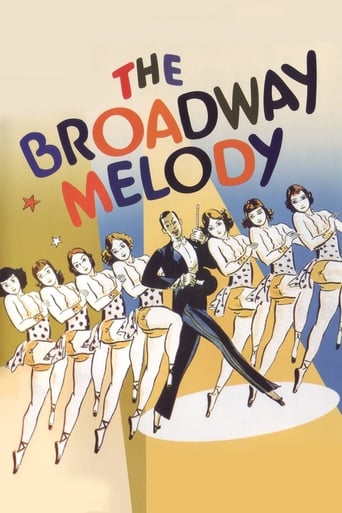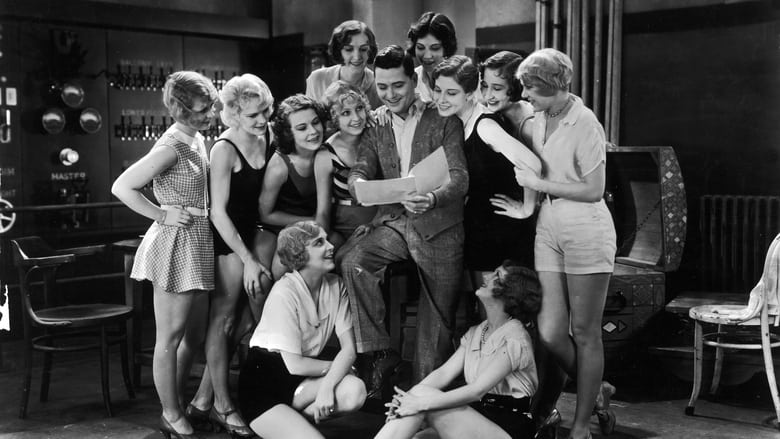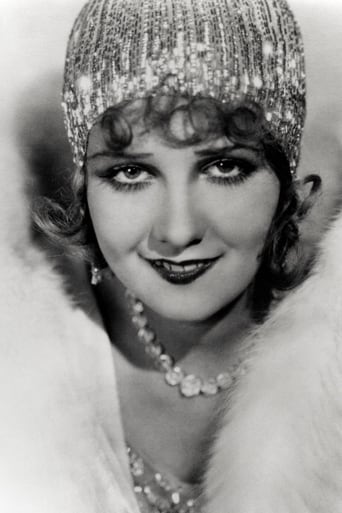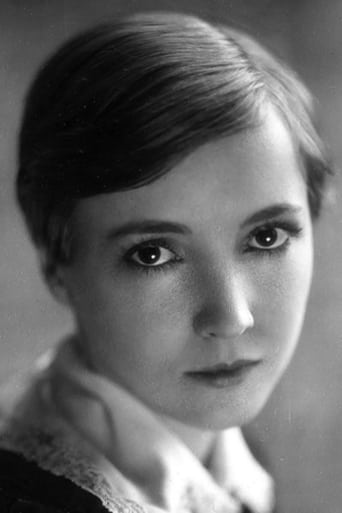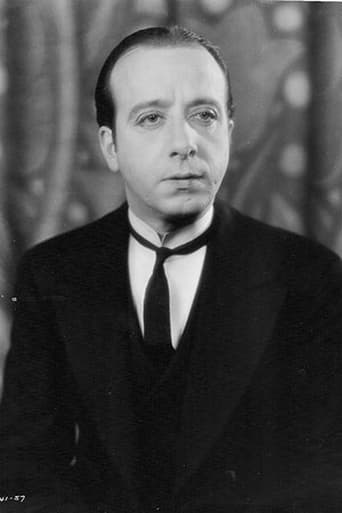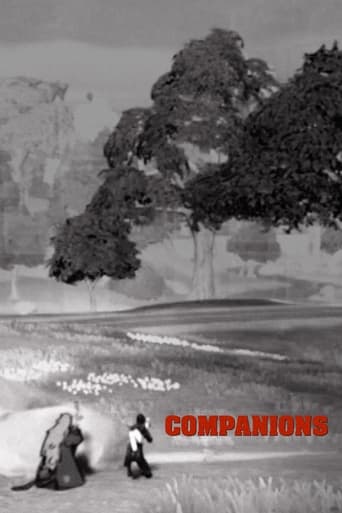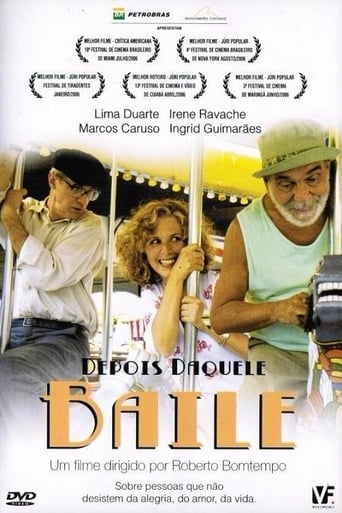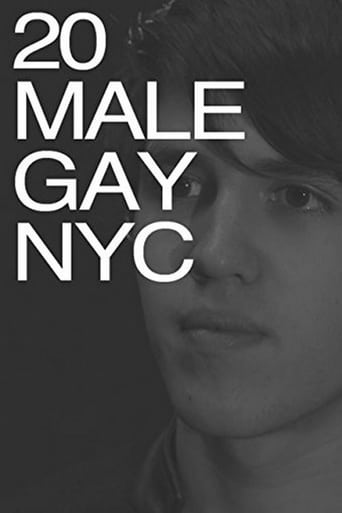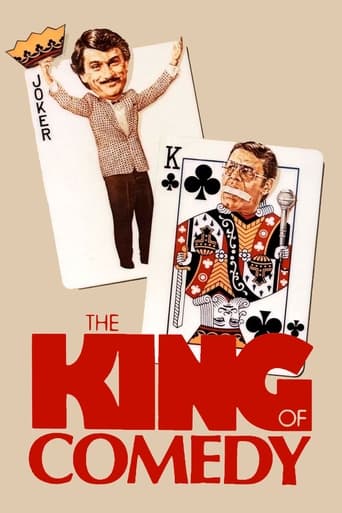The Broadway Melody (1929)

The vaudeville act of Harriet and Queenie Mahoney comes to Broadway, where their friend Eddie Kerns needs them for his number in one of Francis Zanfield's shows. When Eddie meets Queenie, he soon falls in love with her—but she is already being courted by Jock Warriner, a member of New York high society. Queenie eventually recognizes that, to Jock, she is nothing more than a toy, and that Eddie is in love with her.
Watch Trailer
Cast


Similar titles
Reviews
Absolutely the worst movie.
It's funny, it's tense, it features two great performances from two actors and the director expertly creates a web of odd tension where you actually don't know what is happening for the majority of the run time.
The thing I enjoyed most about the film is the fact that it doesn't shy away from being a super-sized-cliche;
A clunky actioner with a handful of cool moments.
"The Broadway Melody" can be appreciated more for its context than its content. Although it contains some pleasant music, the dialogue is mediocre and the acting is mundane. However, it spans the transition from silent films to talkies--a transition that occurred so quickly that this film, which was MGM's first talkie, still contains remnants of the silent era.Most notable are the title cards which announce the locations though unnecessary. Also, the film companies were scrambling to find talent that could optimize the advent of sound. Charles King plays the male lead, Eddie Kerns, as if he is impersonating Jolson in both song and speech. He is unable to deliver his lackluster lines with conviction, so Eddie comes off as a shallow character. The two sister characters, Queenie (Anita Page) and Hank (Bessie Love), do feel like sisters. Love acquits herself the best, delivering an enthusiastic performance.The film feels like a glimpse behind the scenes of a Broadway revue. And its pre-Code atmosphere helps in that regard. Though some of the action takes place on a stage, there are song performances that advance the plot--a new development--like "You Were Meant For Me". The title song, also by Brown and Freed, is ubiquitous throughout the film, but could have been used to better effect. Here, it's just a throwaway tune that Eddie hopes will be successful.This film was 1929's top grosser and won the Oscar for Best Picture, so they did some things right. But in just a few years, talkies would blossom to fullness, giving viewers musical classics that are still loved today.
Keeping in mind that the film is 80 years old and was made just when sound was new its interesting to see considering that it won best picture the year it came out. You can still feel the studios adjusting to the new medium since at several scene breaks they still use title cards, the sound is often uneven, the acting techniques antiquated and the plot older than the hills. With all that taken under advisement the picture is still worth viewing to see for the archetypes that it established and of course being a pre-code it has a racier content than would have been allowed even five years later. Famed songwriter Nacio Herb Brown, Singin in the Rain, Good Morning etc., is featured in the cast next to his future wife, albeit briefly, Anita Page. More of an fascinating artifact than a truly great film it's still worth watching at least once.
The film had great music, dancing and acting. I particularly enjoyed the Wedding of the Painted Doll number which was vibrant and fun; I loved how they had the dancers rise up through the stage floor. Some of the songs were later used in the 1952 musical Singin' in the Rain (one of my all-time favourites) so it was interesting to see them in their original context and get some of the references used in that film.Charles King had a lovely singing voice, adding a beautiful performance of the hit song "You Were Meant For Me". Anita Page, known at the time as "the girl with the most beautiful face in Hollywood" shone as Queenie. Her acting lacked a bit of naturality, however it's important to note in the post-silent era they were still hired more on their looks than their vocal skills. Sadly, the storyline seemed to lose focus and become disjointed; I had not developed enough of a relationship with the characters to care about the love triangle (which was solved too conveniently). It seemed to me the major focus was on the sound, being a fairly new addition to films of that era, and the scriptwriting fell on the wayside as a result. The title makes it sound like a musical of non-stop excitement whereas the storyline was quite dull, making it seem to go on for longer than 100 minutes. For the time, however, it must have been such a marvel to see talking and singing on screen that the audiences of 1929 wouldn't have been too bothered about the plot. I can't be too harsh of course, it was 1929 after all and many aspects of film (especially audio) were in their infancy. It's worth seeing, even if just for the Wedding of the Painted Doll and to see how far films have come over the decades since.
"The Broadway Melody" certainly has the obvious handicap to holding up; in that, it's 82 year old; but it still is a worthwhile view for lovers of either film, theater, music, or particularly musical theater. I, being passionate about all of those would be an ideal candidate to watch it. Thus with my appreciation for nostalgia no matter how ancient it may become, should be a prime target for this film today if there are any targets for it. Nevertheless, even as a nostalgic piece, the film still makes it off of others issues besides its writing. The plot is nothing stellar, the characters work well into the plot but aren't incredibly complex, and some of the outcomes can feel too contrived. Even for 1929, the film makes it off of novel breakthroughs for its time such as its catch music and its appropriate integration of music into the story.If the "Broadway Melody" deserves credit for nothing else, it deserves credit for bringing musical theater genre to film. It is even mildly disputable as to whether everyone would consider it a musical today or not. It naturally implements songs into the story, but the use of songs lacks the escapist element necessary to a true musical. Christopher Walken describes Gene Kelly as a master of performance who sang when he didn't feel words were strong enough spoken, and danced when words were meaningless. The songs in this film are all during scenes in which they show the film is about is being performed or when the writer of the songs is presenting his songs to someone openly. There are certainly no musical numbers that play on the obvious plot hole musical theater should lend itself to, leaving audience members asking how every person surrounding knows how to perfect perform in sync with each other. Most of the songs are solo songs anyway, with brief duet, trio, or chorus moments perhaps. It is basically a musical to the same extent that "The Great Ziegfeld" is or to the extent that "Topsy Turvy" is an operetta. Regardless of the implementation however, that songs illustrate the characters and pace the film nicely. The songs don't necessarily expand the plot the way musicals' songs generally should, but they do elevate characters' revelations at points, especially Eddie's lament to Queenie. Perhaps however, it was to the film's credit that it didn't immediately switch to true escapism when the movie was made. Musical theater escapism is always very tricky in cinema. Creating an atmosphere in which the audience really feels like the characters are singing and thus the viewers can feel attached to the moment is quite difficult in the more realistic setting film frequently calls for. Such handicaps have especially been prominent with film occasional exceptions such as Chicago in recent years, but the live-action musical theater scene has not been a too marketable since the 1960's in light of such difficulties."Broadway Melody" does not have a bad plot, but it does not have a particular novel one either. The plot allows conceivable conflict, but works little at all more your generic hallmark writing ploy. Film may have been still fairly new in 1929, but theater sure was not. The plot does not have the excuse of its outdated platitudes. Hank and Queenie Mahoney are sisters who have been doing a successful vaudeville duo act for a while now until Hank's boyfriend Eddie Kearns writes them both into his new show, "The Broadway Melody", getting them the chance to become stars in the big apple itself. As it turns out however, the real woman Eddie is in love with is Queenie, not Hank especially as Queenie becomes a bigger and bigger star on the stage. As Queenie becomes successful enough, a sleazy agent name Jack Wariner makes a pass at her, evidently using her to promote himself. While Queenie knows he's using her, she can't bring herself to express her true feelings for Eddie and cause conflict between herself and her sister. The outcome is nothing stellar; in fact, there are some details I will not spoil the movie and reveal, but that make the outcome less than masterful.This film is entertaining with enough going for it to fill 100 minutes of your life. The songs are catchy, the characters are likable, and the cast gives appropriate treatment to each conflict and resolution. The writing is nothing to shout about all though. The script is essentially an excuse to implement Nacio Herb Brown and Arthur Freed's numbers. To the extent that it brought musical theater to cinema and broadened the potential of sound, it is a valiant effort to film history. It is thus, worth seeing for lovers of film or musical theater if not for the sake of marvelous entertainment, that sheer indulgence at the very least.

